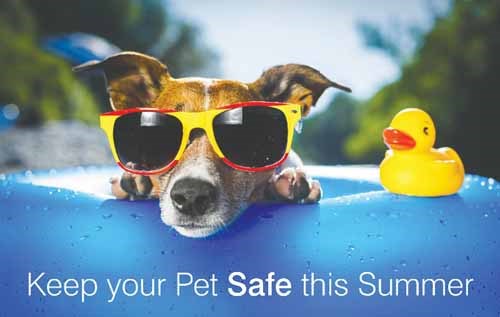There are many things to worry about when trying to keep cool as the temperature rises. One thing that often gets forgotten is how the family pet is battling the heat. Animals are susceptible to overheating because of their limited ability to sweat. When there is not enough ventilation or the humidity is high, the animal cannot control its body temperature effectively by panting. If their body temperature exceeds 40°C and they are not treated, the result can be permanent brain damage or death.
Keep your pet safe by following life-saving tips from St. John Ambulance:
Always carry water with you and actively seek shade for your pet.
Walk your pet early in the morning or late in the evening to avoid excessive heat during the hottest hours of the day.
Avoid pavement and cement when walking your pet to save their feet from getting burnt and to prevent your pet from overheating. Wetting your pet's feet or pads can also give them relief from the heat.
If your pet is comfortable with baths, take them for a dip to help them cool off.
NEVER leave your pets in a parked car. Even with the windows rolled down, a car can get to very dangerous temperatures for your pet.
Take the St. John Ambulance Pet First Aid Course which provides the knowledge, judgment and skills needed to respond safely and effectively to emergencies for domestic animals.
If your pet begins to exhibit signs of heat stroke or heat exhaustion lower their temperature using cool water and shade and consult your local veterinarian. If signs worsen or your pet's temperature exceeds 40°C, take them to the vet for further examination and treatment. Signs of heat stroke to look for are:
Rapid, noisy panting
Thick, stringy saliva
Vomiting or Diarrhea
Loss of consciousness
Seizures
Bright red mucous mebranes
Bloody stools
Knowing what to do in an emergency can make all the difference. As a volunteer based non-profit charity, St. John Ambulance is dedicated to improving individual's health and safety. For more information on courses and how to protect yourself, your family and your pet, visit www.sja.ca.




